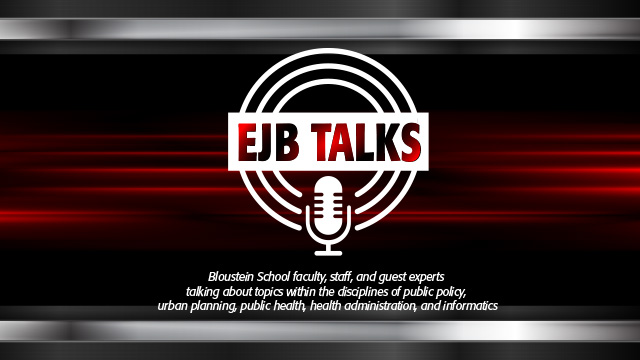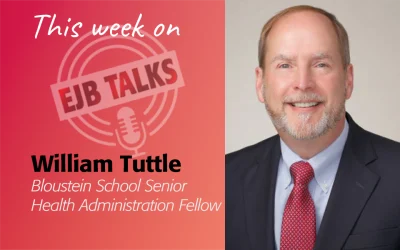For the season two finale of EJB Talks, Stuart Shapiro talks to Amy Cobb to give us a glimpse ahead at the political and policy prospects for 2021. From the good news of vaccine development and distribution to the more worrisome economic conditions to the first 100 days of the Biden presidency, Professor Shapiro gives a hopeful but reality-based forecast of what our country and the world has in store. The pair also give a quick peek at the third season of EJBTalks which will return in January. Happy 2021 everyone!
Stuart Shapiro
Welcome to EJB Talks. I’m Stuart Shapiro, the Associate Dean of Faculty at the Bloustein School. And the purpose of this podcast is to talk with my colleagues and our alumni about policy planning and health and the interaction between these issues, and how they affect people in New Jersey, the United States in the world.
We’re reaching the end of 2020 today, and most people are breathing a deep sigh of relief at that notion. As a conclusion to the year and as a conclusion to this season of EJB talks, I’m going to talk a little bit with the help of Amy Cobb, who will step from the other side of the glass to ask a few questions I’m going to talk about the year ahead. Rather than looking back at the often disastrous year that passed, let’s look ahead and see what 2021 has to bring. And I’ll focus on politics and policy, but al/so set the stage for talking to my colleagues about policy planning and health. Amy,
Amy Cobb
Hey, good morning Stu. It’s been a long year, it’s been a crazy year. Um … there are… and, you know, every day is something new in 2020. There are a lot of crazy stories going around. What should we really be focusing on right now? What should we be paying attention to?
Stuart Shapiro
So if we want to think about what’s going to have an impact on 2021 of what’s going on right now. It’s really not the stuff that gets people’s blood pressure going, the stories about Trump contesting the election, the stories about the lawsuits, even the stories about those supporting Trump, which have deeper, long-run implications. But come January 20, 2021, Joe Biden will be president. And he will face a very difficult challenge ahead of him. And the extent of that challenge really depends on several factors that we should keep our eye on over the next month. In the most immediate term, is the negotiations going on in Congress right now, regarding funding the government and the stimulus package?
Much of the CARES Act, which passed back in April or May, much of that money has been spent. Many of those programs are have either expired or are set to expire. And with COVID continuing to ravage the economy, not to mention people’s lives, there is going to be a dire need for economic stimulus in the new year. And to ensure that Joe Biden doesn’t take office with a major recession raging, it would be very helpful to see a stimulus passed in the next couple of weeks. The extension of unemployment benefits, protections for small business to paycheck protection for small businesses, aid to state and local governments are all key components of what we need to see the federal government do in order to stave off economic catastrophe. So whether or not Congress reaches a deal on that is probably the most important thing going on right now and not yet getting the attention that Trump as always gets.
The second thing, of course, is the pandemic. We have 3000 people dying every day. And it’s horrific. It’s across the country, no area of the country is being spared. We now have the approval of the Pfizer vaccine. Hopefully the Moderna or one will follow soon afterward, and then others behind them. But we, while there is finally a light at the end of the tunnel with the pandemic, the tunnel is at its darkest over the next month, couple of months. Because while case counts may start to drop, those people that have contracted COVID over the past month are going to fill up hospital beds, already are filling up hospital beds, and the casualty counts will probably climb further. So that’s the other thing to really pay attention to over the next month and it has to be Biden’s top priority when he comes into office is doing what he can to mitigate the suffering that’s occurring as a result of the pandemic.
And then finally on the politics front, of course, and this will affect the Biden presidency dramatically, are the Georgia run-offs on January 5, one between Raphael Warnock and Kelly Loeffler and another between David Perdue and Jon Ossoff with control of the Senate likely hanging in the balance there.
Amy Cobb
Well, that’s a lot of stuff Stu. So I’m going to go back to one of the first things you mentioned, which was, the stimulus and the CAREs Act. There’s an argument going on. And the big thing I’ve heard is that it’s about shielding companies from lawsuits. But I’ve also heard that there’s some infighting, and oddly a pair that I was very surprised, Sanders and Hawley, they want a $1200 stimulus check sent out, as we had before, and pretty much the rest of Congress is like, yeah, we can’t do that again. Are you surprised by this, particularly the Sanders and Hawley coming together, considering they’re so different? And what do you think? Do you think it’s just Mitch McConnell, who really is the one blocking lawsuit protections? Or do you think that there are a lot of folks in Congress that are a little worried about private industry?
Stuart Shapiro
Well, I think McConnell has made clear from the very beginning that liability protection is essential in any stimulus bill, and therefore it will be in any stimulus bill. And I think probably a significant majority of McConnell’s Republican caucus agrees with that sentiment. So I think it will be in there. I don’t agree with it, I don’t think it’s a good idea. But it may just be the price we have to pay to get a stimulus bill of any size. You know, I think the outcome is deeply uncertain. At this point. If you had a coherent executive branch that was focused on something besides frivolous lawsuits, you would have a clearer idea of what we were gonna get. But the fact of the matter is, it’s not clear what the President will sign. And we also have McConnell’s incentives, which are not to make things easy for the Biden administration. So both of those things cast some doubt on whether or not we will eventually have a package.
On the other hand, the widespread of the pandemic, and the economic dislocation that it’s caused, has meant there are a lot more representatives in Congress including Hawley. But even… Hawley is something of a populist, a Trumpist, I’d almost call him. But… so the alliance was Sanders is a little surprising, but not that surprising. But even more, traditional conservative senators are seeing the need for economic aid to their state. And that is, made it possible that we do get a stimulus. Whereas I’d have said two or three weeks ago, it did not seem likely, they still have to overcome McConnell’s resistance, and probably liability protection is the price for doing so. But whether they can reach a deal is very complicated. There’s been a lot of moving parts, a lot of different policy pieces, and a lot of different political actors.
Amy Cobb
And again, they only have until the 18th. But refresh my memory, if you remember, how quickly did the original CARES Act get introduced and passed? I remember it being relatively quick.
Stuart Shapiro
Yeah, it’ll go quickly…
Amy Cobb
It all blends together Stu, I don’t remember…
Stuart Shapiro
Yeah. I mean, you know, it’ll either happen quickly, or it won’t happen. Congress needs deadlines, just like graduate students. You know, when that deadline is facing them, and indeed they want to go home for the holidays, that’s a deadline. And the government runs out of money, they pass, I believe, a one-week extension, the House and the Senate will likely follow and, and Trump will sign, but that’s only one more week, which gets us to the 18th. So with that deadline, they will likely make their decision. And they will decide they in addition to the stimulus have to decide the funding of government. And so you’ll see a big Omnibus package, which may or may not include stimulus, but you’ll see it in almost all certainty next week. Could it go on a few days beyond next week? Sure, I could see them pass a resolution for a couple of days here there, but they will want to be out of there by Christmas.
Amy Cobb
Right. Okay, so let’s turn to 2021, which is not that far away now. And think about the Biden administration. I think, you know, I’d like to know how the Biden administration can reverse some of the Trump policies, which ones can they do quickly? Which ones do we not really have hope for right now? And most honestly, do you even think he’s going to be thinking about anything other than really COVID and stimulus and vaccine distribution, the first month or two in office?
Stuart Shapiro
Well, Biden himself will have to give attention to those issues primarily and almost solely, along with a sort of foreign policy, which never really goes away for a president. But he has a whole administration. And so he…..
Amy Cobb
He really does. He’s got great people lined up it’s exciting,
Stuart Shapiro
It’s going to be staffed, assuming they get confirmed. He’s gonna be staffed with people with expertise in governance, and who will be able to get things done. But there.. one of his priorities will be reversing Trump’s policies where possible. Now one advantage for Biden is that Trump did much of his policy solely through the executive branch, which means that it can be reversed solely through the executive branch. Theoretically, Biden could sign an executive order on January 20, that says, “All executive orders issued in the past four years and null and void”. That’s a legal action, there’s nothing anyone can do to stop it. Whether he wants to do that or not, is another question whether he just wants to do them one by one, or whether he wants to do an order that takes care of most of them but leaves the few that are useful in place. All of those are decisions I’m sure they’re spending a lot of time on right now.
Regulatory decisions, the area that I spend most of my time thinking about things like the environment, things like immigration, education, health, etc. Those take a little longer to reverse. But again, because the Trump administration was very… it rushed things and did not really care about the details too much. And to be frank, was not terribly competent. All of those things make it easier to reverse even their regulations, which usually take longer. So within the first six months, it wouldn’t surprise me if a number of regulations that are currently tied up in litigation, the Biden administration settles on and gets rid of the Trump administration regulations.
Now there are some like net neutrality, and a few things in environment that will take longer, they will have to go through a couple years-long regulatory process to get rid of them, but they will start those quickly. And hopefully, by 2022, late 2022, most of those will be reversed as well. The only things they can’t reverse are the things that were in the statute because that you need Congress to reverse. Things like the tax cut, the repeal of the individual mandate, but there’s not much of that stuff. Those are the things that are untouchable. On the foreign policy front, we’ll go back into the Paris Climate accords and the World Health Organizations by January 21. The Iran deal much more complicated and what happens there depends on a lot of factors outside Biden’s control.
Amy Cobb
So he has a lot on his plate, but hopefully a bunch of good professionals who can help him out considering he’s had decades in service. So I’m feeling I’m feeling I can breathe a little easier Stu, maybe I’m kind of curious (laughing)
Stuart Shapiro
Well, that’s what it’s all about Amy. (laughing)
Amy Cobb
Yeah, of course. I don’t know. Nothing feels like it’s real. 2020 has really been overwhelming, I’m sure to a lot of folks. I’m looking forward to the new year. I’m looking forward to the new administration. And finally, maybe you can talk about since this is our last EJB talks of this season and this year, what we’re possibly going to be focusing on come January for season three.
Stuart Shapiro
So we’re gonna try and take advantage of the fact that it is a new dawn. We–America–has been through a horrible year. We’re not through this awful period yet. Obviously, as I mentioned earlier, the pandemic continues to ravage the country. And we’re in a deep economic recession. But those of us that are sort of looking over the long haul, can think about what effects have the political, economic, and medical crisis of the past year had and what will the long term impacts be? And I think, as we start season three of the podcast, we’re going to try and focus on what to look for in the years ahead in public policy, in urban planning and public health and in informatics. And hopefully we will get a good set of guests that will illuminate those topics and we can look at a wide variety of areas the environment, transportation, health care, health disparities, etc. And what we’ve learned from the year gone by. And so, yeah, hopefully it will be a good exciting season.
Amy Cobb
Yeah, I’m actually really looking forward to this particular first 100 days. That’s exciting.
Stuart Shapiro
Yeah, it’s nice to be there.
So to everyone have a happy holiday season and we will see you in in January, hopefully in early to mid January. We already have some good guests in mind to get us started. A thank you as always to Amy today for her interviewing skills, but usually for her production assistance, and also to Karyn Olsen, who helps us out. Have a great holiday and stay safe.




